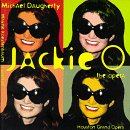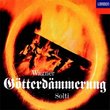| All Artists: Michael Daugherty, Houston Grand Opera Orchestra & Chorus, Christopher Larkin, Nicole Heaston, Stephanie Novacek, Eric Bowens, Jonita Lattimore, Wayne Koestenbaum Title: Jackie O - The Opera Members Wishing: 0 Total Copies: 0 Label: Decca Release Date: 8/12/1997 Genre: Classical Style: Opera & Classical Vocal Number of Discs: 1 SwapaCD Credits: 1 UPC: 028945559124 |
Search - Michael Daugherty, Houston Grand Opera Orchestra & Chorus, Christopher Larkin :: Jackie O - The Opera
 | Michael Daugherty, Houston Grand Opera Orchestra & Chorus, Christopher Larkin Jackie O - The Opera Genre: Classical
|
Larger Image |
CD DetailsSimilar CDs |
CD ReviewsNot just appalling, but boring too Augustus Caesar, Ph.D. | 07/06/2000 (1 out of 5 stars) "Repetitive and trivializing are the words, unilluminating (and unhummable) the music -- together they reduce these 3 real people to cartoon characters as cardboard as any from an early Verdi opera! Hugely disappointing, especially coming from the Houston Opera. Avoid at all costs -- especially your own! Ugh." Truly wonderful score marred by a truly bad libretto. Augustus Caesar, Ph.D. | Eugene, Oregon United States | 04/29/2004 (3 out of 5 stars) "Michael Daugherty is one of the most idiosyncratic of modern American composers. His work shows a consistent, perhaps occasionally tiring, obsession with pop culture, and despite his awesome technique (he has a Ph.D. in composition and worked at IRCAM with Pierre Boulez), his work is almost invariably accessible and melodic. His debut opera, "Jackie O," is tantalizing evidence of his diverse talents. This is a man who understands how to write for the human voice, and the music here is extraordinarily eclectic, with Verdiesque arias and brilliantly inventive contrapuntal vocal excursions standing beside catchy pop tunes and blues riffs. The scoring is superb as well. Daugherty's resourcefulness and energy are breathtaking. Indeed, this could have been a great new contribution to the operatic repertory if it weren't for Wayne Koestenbaum's horrible libretto. When he's not trying really, really hard to be profound, Koestenbaum is laboring to be funny; in both attempts, he fails resoundingly. This "collage" libretto ranges from fair to deeply embarrassing, and ultimately collapses under the weight of its own cliches. A skilled librettist with an original mind could have made something good out of this concept (which isn't that great in itself). Unfortunately, Koestenbaum has a pedestrian mind and a heavy-handed "wit." So there you have it.All in all, "Jackie O" manages to be rewarding thanks to its extraordinary music, despite the pretentions of its libretto." Yeah, but... Augustus Caesar, Ph.D. | 09/10/1998 (2 out of 5 stars) "So many mixed feelings... Sometimes I feel like Classical music needs a swift kick in the butt, and those are the times when I think Michael Daugherty's irreverence borders on the heroic. Then sometimes I'm listening to Michael Daugherty's music and I feel like his irreverence acts to trivialize what he's doing, to that point that nothing's left. So, when listening to Jackie O I first thought, "Wow, he's got Andy Warhol as a character and operatic voices singing blues riffs...cool!" But as I listened, "Jackie's Song", which is a lovely, melancholy solo cello line at the opening, gets repeated so often and in such irreverent way that I felt he was trivializing Jackie's grief. By the end of the opera, her grief is sort of boiled down to this one melody and one line of dialoge that she gets stuck singing over and over...the repetitiveness makes you want to say "So your husband got shot...get over it!" Irreverence and wit don't necessarily mean callousness and shallowness, but that's what ends up happening in this opera. I'll keep listening to Daugherty, though, because maybe sooner or later he'll hit on the right mix of humor and depth."
|

 Track Listings (19) - Disc #1
Track Listings (19) - Disc #1